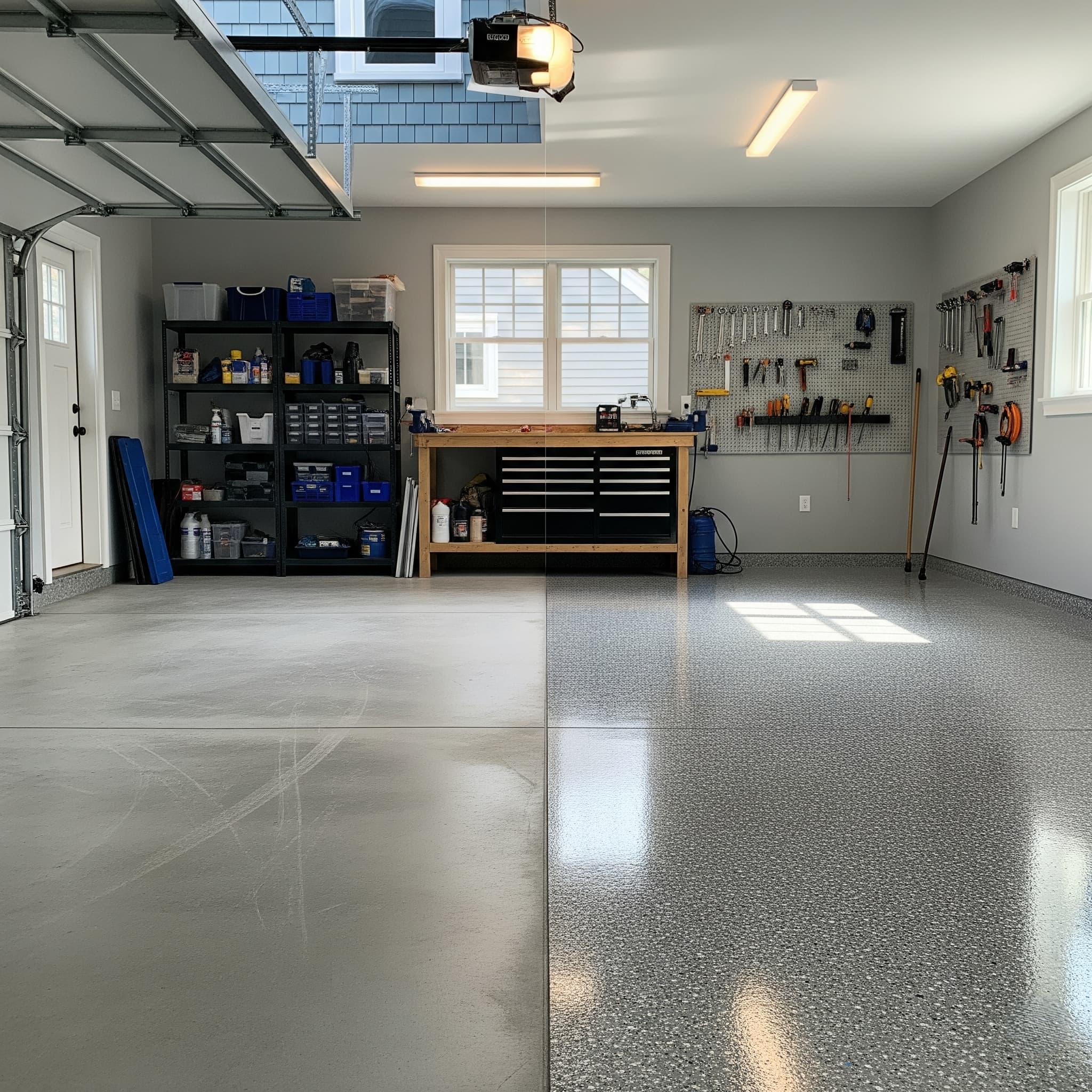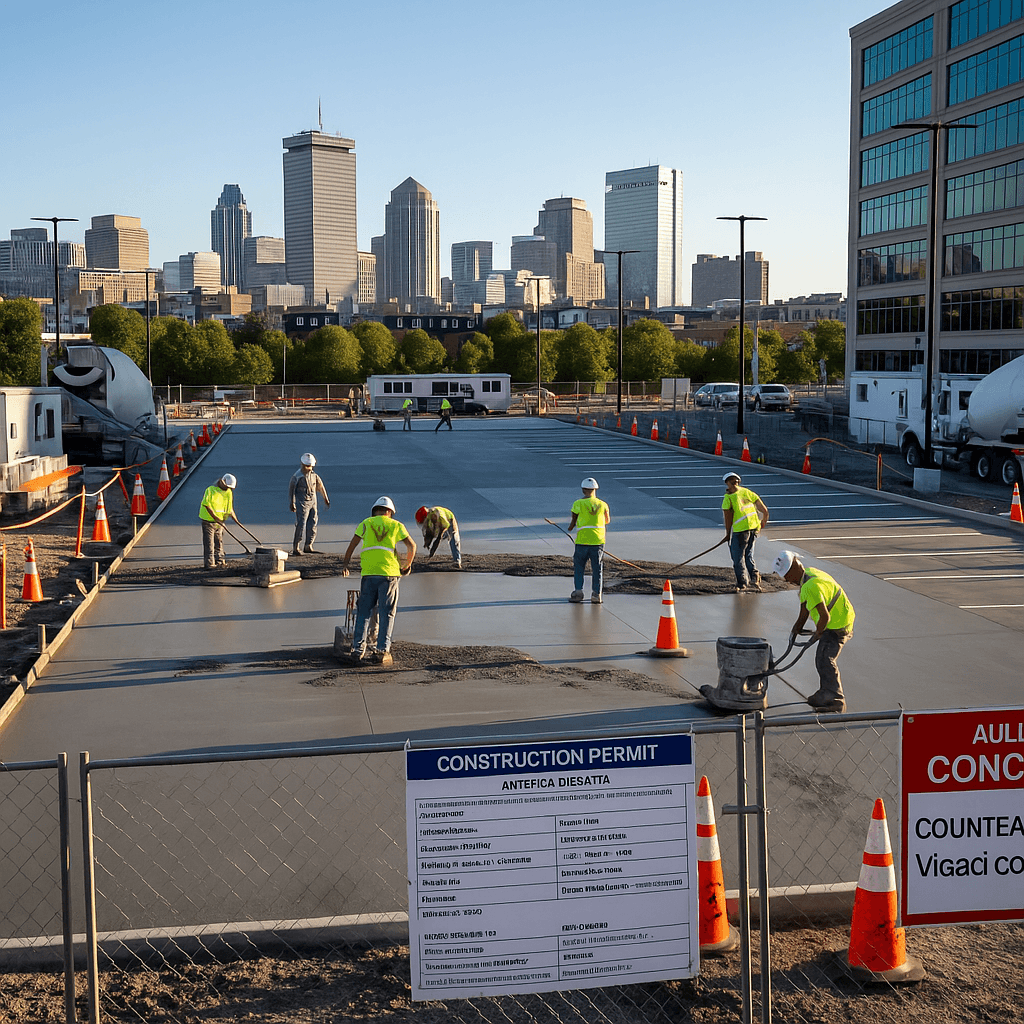
Cost & Time: Concrete Resurfacing vs Replacing in Greater Boston
Concrete Resurfacing
When homeowners from across Greater Boston notice that their concrete is showing signs of aging (worn, cracked), they are faced with a difficult decision. If it is a driveway near Fenway Park or a patio in Cambridge, whether to renew the existing surface or replace the entire area will have a significant impact on the cost, as well as how quickly the project can be completed. The knowledge of the financial consequences of each option and the time involved will help homeowners make an informed decision. Contractors who specialize in concrete use several factors when deciding which process will be the most beneficial for a homeowner, including the condition of the surface, local regulations regarding permits, and the long-term benefits of the chosen process.
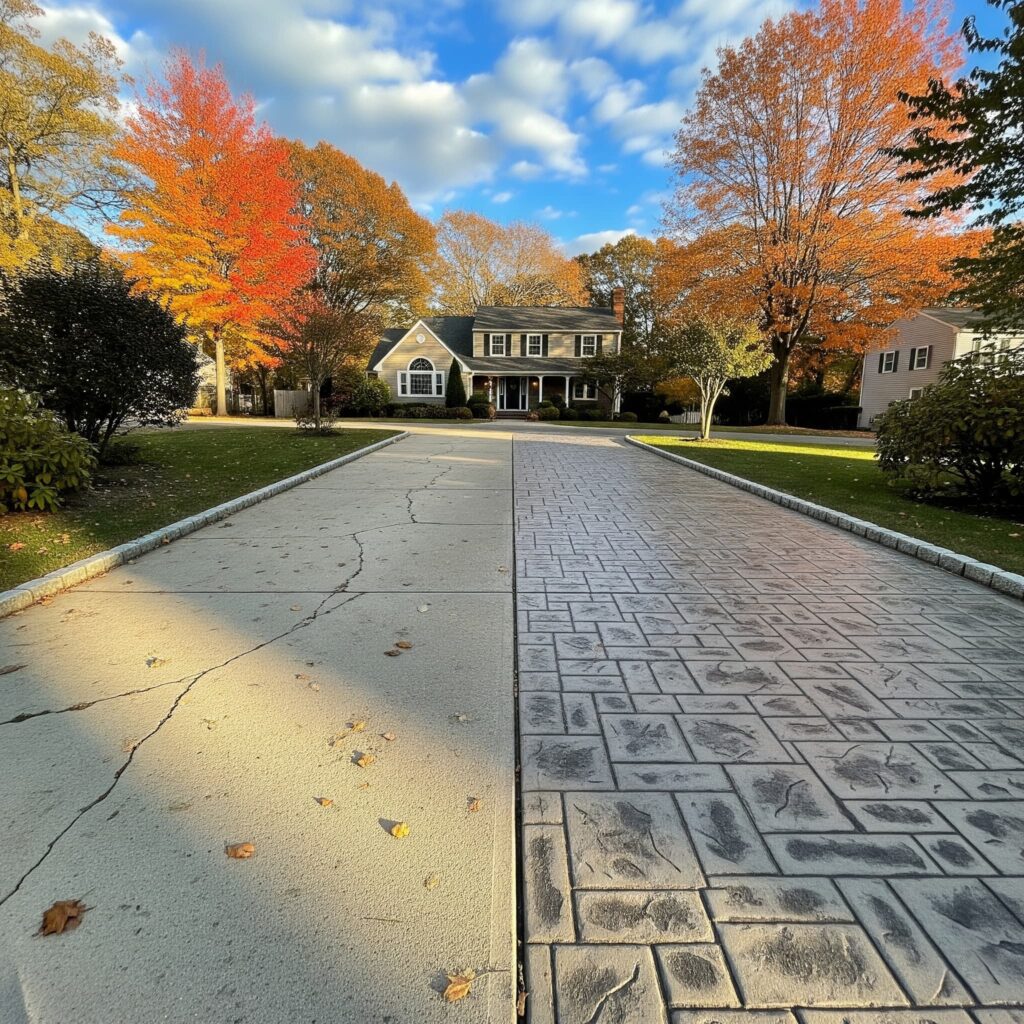
Understanding Cost Estimates for Concrete Resurfacing Work in Boston
Concrete resurfacing offers a budget-friendly alternative to completely demolishing and replacing damaged surfaces. For most residential concrete resurfacing projects in the Greater Boston area (Suffolk County), cost estimates are typically provided as a range of $3 to $9 per square foot. Decorative options such as stamped overlays, which provide both an aesthetically pleasing finish and functional restoration of damaged surfaces, can cost anywhere from $7 to $20 per square foot.
In terms of basic concrete overlay jobs, the average homeowner will pay anywhere from $1,693 to $2,435 for a standard job. Cool-deck coatings can add approximately $4 per square foot to the overall cost of the job. Surface-area measurements, along with the current condition of the surface to be resurfaced, will greatly affect the final cost of the job. Damaged surfaces will require additional prep work.
Factors Affecting the Cost of Resurfacing Jobs
There are many factors that contribute to the final cost of a resurfacing job in the Boston area. Initial estimates based on surface area will be affected by the current condition of the surface being resurfaced. Decorative elements, including staining, texturing, and custom pattern designs, can greatly increase the cost of materials and labor associated with the project.
The severe winter conditions in the Boston area create specific challenges to maintaining concrete surfaces; therefore, local contractors must consider these conditions and the specific overlay systems used when considering the potential cost of a resurfacing job.
Additionally, when working in the city streets, obtaining permits to allow equipment access may result in additional costs, ranging from $50 to $500.
Cost Estimates for Complete Concrete Replacement
A complete concrete replacement is a large investment in relation to the cost of a resurfacing job; however, complete replacements can offer long-term durability to damaged surfaces. The average homeowner in the Boston area can expect to spend anywhere from $9 to $15 per square foot for reinforced-concrete installation. This translates to approximately $3,000 to $8,000 for the replacement of a typical two-car concrete driveway, depending upon the site conditions and finishing options chosen.
Materials alone cost approximately $173 to $208 per cubic yard in the Greater Boston area. These prices represent the current market prices for the materials and the shipping costs associated with getting materials to the job site. Labor costs, including the removal of the old concrete, preparing the site, installing the new concrete, and completing the finishing touches, will add another $5.50 to $9.00 per square foot to the total cost of the job. Therefore, larger replacement jobs located in historic areas of the city, such as the North End or Boston Common, must be well-planned to fit within a homeowner’s budget.
Additional Costs for Replacement Jobs
Demolition costs are estimated to be approximately $1.60 to $2.50 per square foot for replacement jobs. Demolition costs include removing the old concrete and disposing of it properly. Massachusetts regulations require proper disposal of old concrete, and the cost of proper disposal may be added to the demolition cost of a replacement job.
Site access in historic areas of Boston may present additional complications when working on a replacement job. Special equipment may be required to access certain sites, which may add additional costs to the total cost of the job.
Delivery of materials to the job site can vary in cost depending on location and quantity. Delivery costs for a single truckload of materials can range from $160 to $340. Larger replacement jobs will require more than one truckload of materials, resulting in increased transportation costs.
Reinforcing materials, such as rebar or wire mesh, are available to add structural integrity to replacement jobs. These materials can add approximately $1 to $3 per square foot to the total cost of the job.
Timeline Comparison of Resurfacing and Replacement Jobs
The timeline for completion of a resurfacing job is generally shorter than the timeline for a replacement job. Resurfacing jobs typically take anywhere from one to three days to complete. Homeowners are able to maintain their daily routine during the short duration of the project. Replacement jobs take longer to complete, typically five to ten days, including demolition of the old surface, preparation of the site, pouring of new concrete, and curing of the new concrete.
The weather in the Greater Boston area has a major effect on the length of time needed to complete a resurfacing job. Spring and early fall are the ideal times to perform either type of job. Winter weather prohibits any outdoor work, and summer weather can speed up the curing process, but care must be taken to control moisture to prevent defects in the finished surface.
Regulations and Permit Requirements for Concrete Work
The Inspectional Services Department of the City of Boston requires building permits for significant concrete work, particularly projects that exceed 1,000 square feet. Short-form permits cost $20, plus $10 per $1,000 of the project value. Typically, short-form permits are processed within a few days. Long-form permits require detailed plans and additional review time, and therefore, may extend the time before a project can begin.
Street occupancy permits are required when equipment blocks public access in areas such as Beacon Hill or the Financial District. Street occupancy permit applications require seven business days’ advance notice and a detailed traffic management plan. Street occupancy permits add one to two weeks to the overall project timeline.
Durability and Maintenance of Resurfaced and Replaced Concrete Surfaces
Resurfaced concrete surfaces generally have a lifespan of eight to fifteen years. At the end of this period, the surface will need either extensive maintenance or possibly reapplication. Properly performed installation and regular sealing of the resurfaced surface will greatly extend its service life, protecting it from the harsh weather conditions of the Boston area. However, regardless of the quality of the installation, any underlying structural problems can still cause damage to the resurfaced surface over time, requiring remediation in the future.
Complete replacement of a concrete surface provides 20 to 30 years of reliable service, assuming the new surface is properly installed and maintained. Higher initial costs for quality materials and professional installation will ultimately provide long-term benefits through greater durability. Regular cleaning and periodic sealing will protect the surface from salt damage caused by harsh New England winters.
Selecting the Best Option for Your Property
Assessing the surface condition is critical to determining the best course of action for repairing your property in the Greater Boston area. If you have minor cracking, wear on the surface, or only cosmetic concerns, resurfacing treatments are likely sufficient. However, if you have structural problems, widespread cracking, or settlement issues, a complete replacement of the surface is recommended to ensure it remains durable over the long term.
When choosing a course of action, budgets must certainly be considered; however, the long-term value should be the primary consideration. Resurfacing can provide immediate cost savings compared to replacement; however, replacement may ultimately prove to be the better economic decision over time, as it ensures a longer-lasting surface.
Professional evaluation of your surface conditions by a contractor can assist you in making a decision regarding the best option for your home. Once you understand your options, you can proceed with the course of action that best meets your needs.
Boston Concrete Works provides complete assessments to help property owners make informed decisions regarding their concrete surfaces. We evaluate the current condition of your surface, discuss budgetary constraints, and recommend the best possible solution to provide long-term results for your Greater Boston area property.
LATEST POSTS

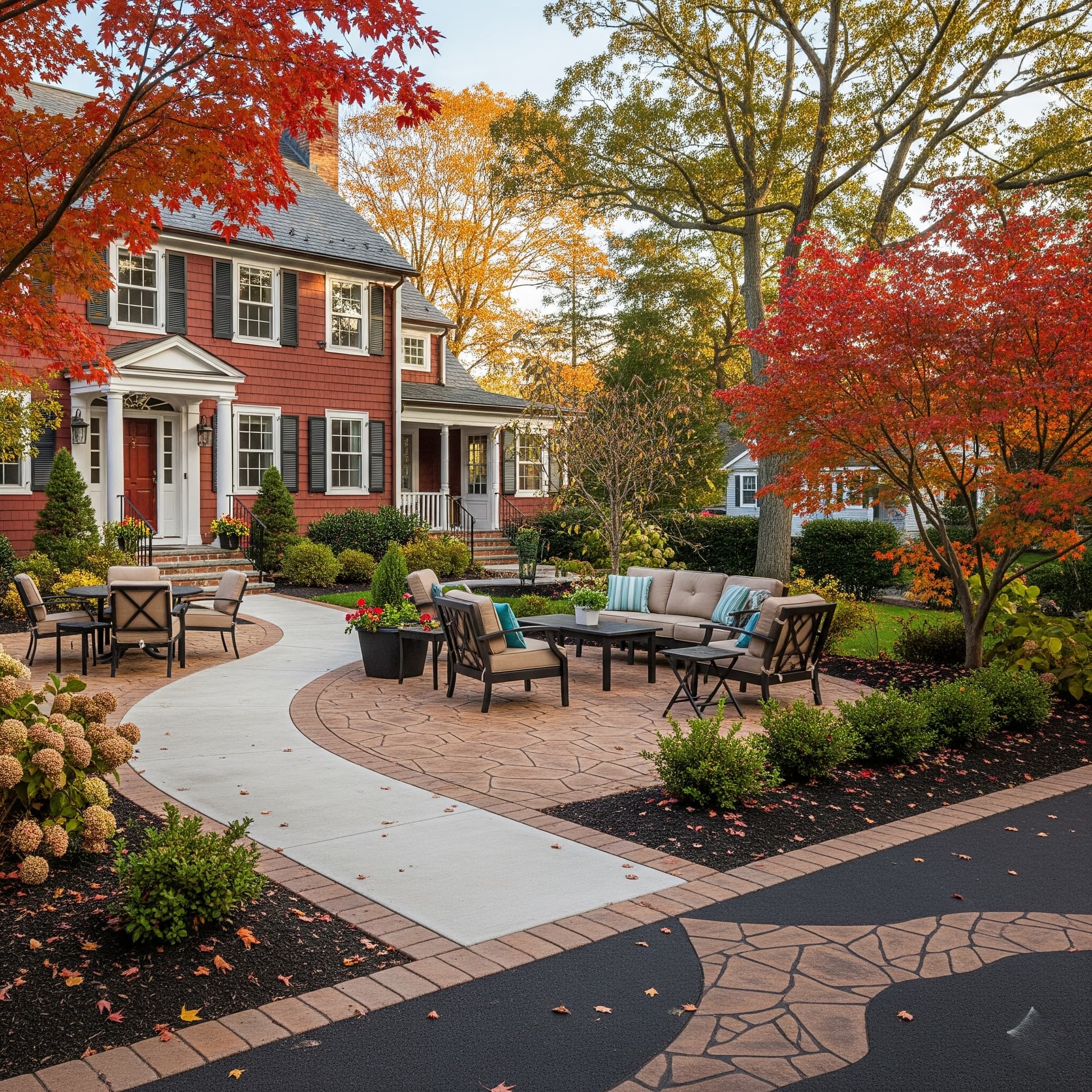
Cost & ROI of Decorative Concrete Upgrades for Boston Homes
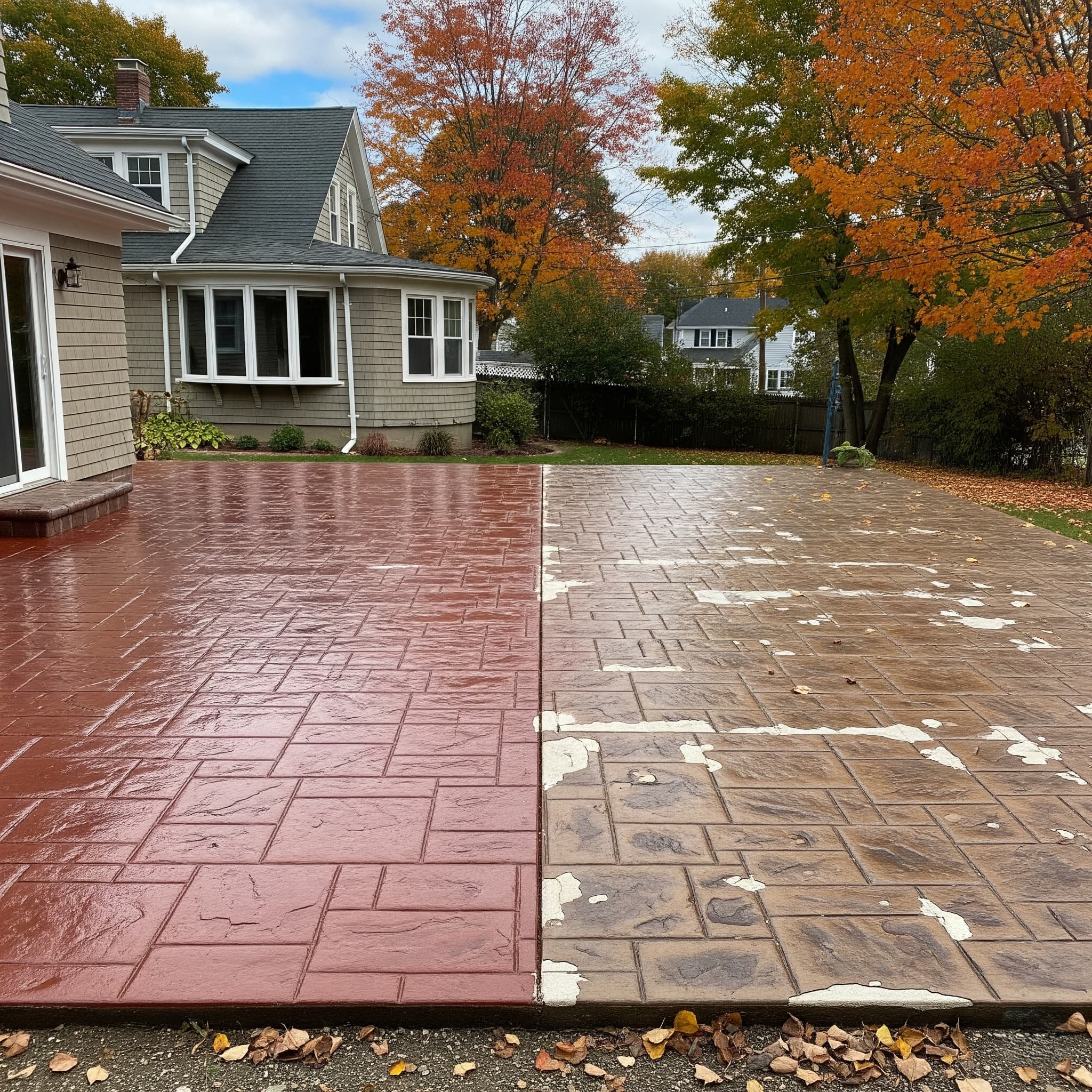
Stamped Concrete Mistakes to Avoid in Wet/New England Climates
